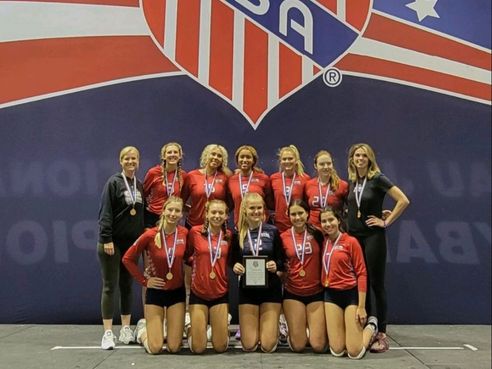Beyond the Court: Opening Up the Conversation Around Mental Health
07/09/2022
Volleyball players Maddie Newton and Eva Turner share their experiences with mental health, and why it's important to talk about it. Both recently competed at the 49th AAU Girls' Junior National Volleyball Championships. (Photo of Newton's team)
Trigger Warning: This article discusses mental health topics such as depression, anxiety, panic attacks, and self-harm.
Orlando, Fla. – Seventeen-year-old Maddie Newton has played volleyball since she was 10. But last year, she nearly walked away from the sport forever. She had developed debilitating panic attacks whenever she stepped on the court.
“I’d had panic attacks before, just not in volleyball. After the second (panic attack during a game), I was like ‘ok, this is scary. This has happened twice now, where I can’t even go back to playing. I have to stop completely and sit down,” Newton shared. “It was affecting how I played, affecting my team in general, and it prompted me to take a break from volleyball and do some thinking. ‘Can I keep playing volleyball?’ ‘Do I have to quit?’ ‘Can I just play for fun, somewhere not as serious as OTVA?’”
At that time, Newton played for the top OTVA team in Clearwater, Florida. She was being recruited by Division I colleges. But when she stopped playing, those offers disappeared.
“Eventually, I started therapy and I started to get better at managing my anxiety. So, I came back to volleyball having different coping mechanisms for my anxiety and how to manage it while I was playing.”
But in coming back to the court, Newton knew she needed to make a change.
“I decided that the team I was on was too high level for me to be able to manage my anxiety how I wanted to. So, I decided to switch to our 2’s team in Tampa, which is a different level of play.”
She started slowly – playing one set out of each game initially, before working her way back up to playing full time. Her new team and coaches were very supportive. Newton and her coach, Justeen, even developed a hand signal so Newton could alert her when the anxiety was flaring and she needed a break.
“(Justeen) and my teammates and my assistant coach, Nikki, they’re all super understanding and they’re always there for me. They just wanted me to get my joy and love of the game back,” Newton said. “So, that helped my anxiety go away while I was playing. And of course it took time and it took a lot of practice and breathing and what not. And I still get it sometimes, but now it’s mostly controlled.”
Newton’s message to others is simple: “I just want people to know, if you’re playing a sport and you’re struggling with mental health issues, just don’t give up. As cliche as it sounds, not giving up helped me to be able to get to where I am now. And taking breaks is fine. Some people don’t want to take breaks because they think they’ll lose their progress, but taking a break – whether it’s for your mental or physical health – it’s the same thing.”
.jpg)
Above: Maddie Newton
The American College of Sports Medicine (ACSM) agrees with Newton. In a statement on their website, they say “To achieve peak performance, it is important to be equally attentive to both physical and mental health.”
According to ACSM, approximately 30 percent of women and 25 percent of men who are student-athletes report having anxiety. However, only 10 percent of all college athletes with known mental health conditions seek care from a mental health professional.
As for professional athletes, data indicates that approximately 35 percent suffer from depression and/or anxiety, an eating disorder, or burnout.
Unfortunately, research on mental health in athletes has largely been focused on the professional and collegiate levels. There’s not as much information out there on the mental health of adolescent athletes.
But for the youth population in general, the statistics are eye-opening and sobering. According to the National Alliance on Mental Illness (NAMI), one in six U.S. youth aged 6 to 17 experience a mental health disorder each year. 50 percent of all lifetime mental illness begins by age 14. And suicide is the second leading cause of death among people aged 10-34.
–
For 17-year-old Eva Turner, a volleyball player from Texas, that last statistic nearly became her reality.
When she was in seventh grade, she was bullied and beaten up, and her happiness was taking a toll.
“I kept trying to have a positive mind, until it got to the point where I just felt like I couldn’t do that anymore.”
At the same time, her brother was also going through some mental health issues.
“My mom and dad were focused on him, which is totally OK, and that’s what I would want to happen, of course. But at the same time, I didn’t really have anyone. I didn’t have anybody to talk to, so I turned to self-harm, which obviously is not a very good thing to turn to,” Turner shared.
Turner was eventually pulled out of school and she began the healing process. But when she returned her junior year, things took a turn for the worse.
“I had an experience in September where I did get hospitalized due to self-harm. And as much as it is scary, I’m very thankful that it happened. I realized that my whole life I’ve been suffering from dissociative trauma, depression, anxiety, and panic disorders. And I never knew that I had that,” Turner said.
She said she’s grown from that trauma, and has “learned to love myself in a different way”. But the recovery process is far from over.
“I’m still healing and learning. It’s something that you can’t just get away with one session of therapy, or a month of therapy. And that’s definitely something that’s been hard,” Turner said. “I think that the most growth that I experienced in my recovery process was actually seeking out therapy. I finally feel like someone’s there for me. I’m really close with my family, so they’re always there for me, and I know that, but to have somebody who understands what I'm going through, and knows how to help me get through it, that has definitely been an amazing resource.”
Turner also uses sports as a healing tool – playing volleyball, soccer, and running track.
“I’ve played sports my whole life, with my older brothers and my sister. I’ve always been able to use that as an outlet. It’s something I feel like is my home, whenever I feel like I’m in a bad situation.”
–
Both Turner and Newton knew it was important to share their experiences with the world, to help continue breaking the stigma surrounding mental health.
“I just wanted to share my story to help people that may be silently struggling. And help people that maybe don’t know how to tell their parents or coaches, or don’t really know how to deal with it,” Newton said. “Without the coaches that I have now, and the support I have from my family, and therapists, my friends and my teammates, I really would not be where I am right now.”
“It’s really not something that you should hide. I think everyone should speak out and share their story, even if it’s really hard, just to let others know that they’re OK, and it does get better,” Turner said. “Right now, I’m living an amazing life, and if I, a couple months ago, ended up not making it out of the hospital, I wouldn’t have the things that I’m grateful for today.”
Mental health is an issue that people are finally starting to talk about – and athletes are leading the charge: from Simone Biles, Michael Phelps, and Kevin Love to now Maddie Newton and Eva Turner.
“I really think everyone could agree to make mental health a top priority,” Turner concluded.
If you or someone you know is struggling with their mental health, please call:
The National Alliance on Mental Illness (NAMI) hotline
1-800-950-NAMI (6264)
If you or someone you know is in an emergency, call The National Suicide Prevention Lifeline at 800-273-TALK (8255) or call 911 immediately.
 Email
Email Print
Print









